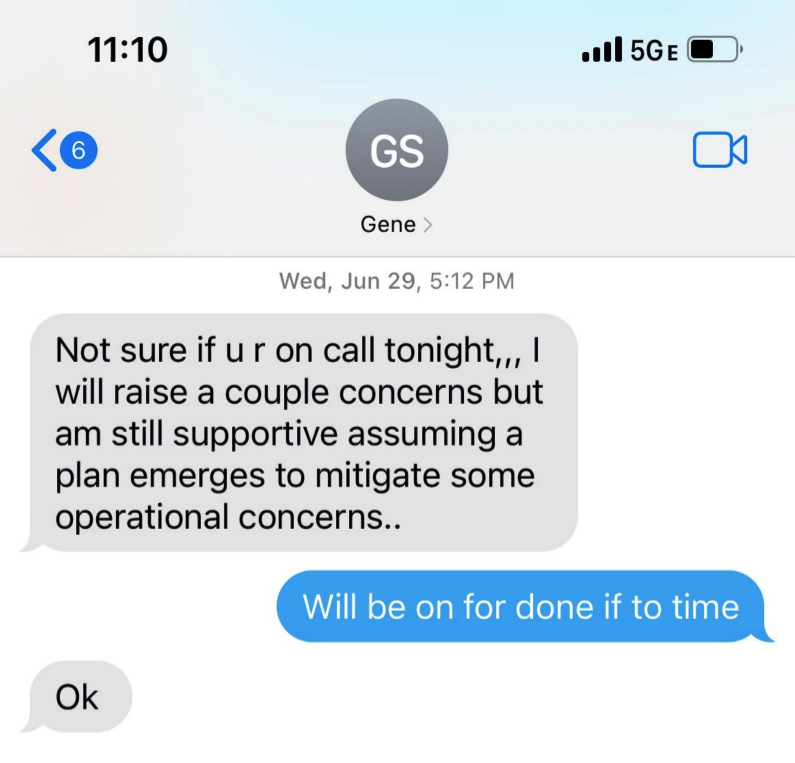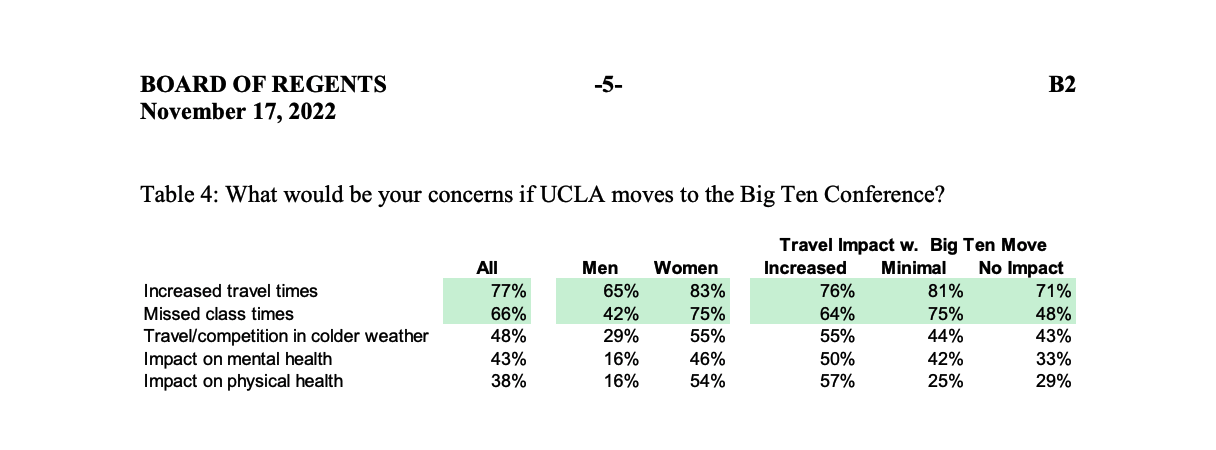Ohio State's Gene Smith wanted plan for Big Ten expansion 'concerns'

The Regents of the University of California will meet in a closed session Wednesday to discuss legal issues regarding UCLA‘s pending Big Ten membership, according to a meeting notice published online. The closed session will be followed by an open session.
The regents will decide UCLA’s future, which reportedly could include requiring the university to make financial payments to offset any negative consequences conference realignment could have on Cal, which is part of the same university system. USC, on the other hand, is a private institution.
But barring any holdups for UCLA’s pending move that stem from the Board of Regents, it’s unclear – at least publicly – how UCLA, USC and their future conference plan to handle important matters related to traveling, scheduling and other logistics. After Big Ten expansion, the conference will have a geographic footprint that spans from California to New Jersey.
Some operational questions were raised before the two Los Angeles-based universities’ intentions to join the Big Ten became public, but it’s unclear how they were, or will be, answered.
On the evening of June 29, 2022, the Big Ten held a Zoom invitation that one Big Ten president labeled as a “Confidential Strategic Meeting.” The following day, news broke that UCLA and USC planned to join the Big Ten.
About 45 minutes before the Zoom meeting, Ohio State Senior Vice President and Athletic Director Gene Smith texted Ohio State President Dr. Kristina Johnson, “Not sure if u r on call tonight,,, I will raise a couple concerns but am still supportive assuming a plan emerges to mitigate some operational concerns.”
On3 obtained a copy of text messages between Smith and Johnson through a public records request for any documents regarding the potential financial, travel or scheduling implications of Big Ten expansion.
The guest list on the invitation for that Zoom meeting included eight Big Ten employees and at least two representatives from every Big Ten institution. In most cases, each member institution’s athletic director and university president or chancellor were listed.
UCLA and USC are scheduled to join the Big Ten on Aug. 2, 2024.
On3 submitted three interview requests for Smith regarding the “operational concerns” and the related “plan … to mitigate” that he referenced in the text message to Johnson. On3 also requested comment from UCLA’s athletic department and the Big Ten Conference. None of the individuals or entities involved have provided comments at the time of publishing.

UCLA athletes share impact of Big Ten expansion
The University of California Office of the President (UCOP) issued a survey to more than 600 UCLA athletes regarding the impact of the Big Ten expansion on its athletes. The results were sent to the Regents of the University of California ahead of a meeting on Nov. 17.
Thirty-five percent of the 111 respondents said they thought UCLA’s proposed move to the Big Ten was a good idea, 20 percent said they had no opinion and seven percent said they thought it was a bad idea. Thirty-eight percent said they needed more information.
When athletes were asked what their concerns would be if UCLA joined the Big Ten, 77 percent of athletes who responded reported concerns about increased travel times. Sixty-six percent expressed concerns about missing class.
Notably, the survey showed female athletes reported significantly higher levels of concern than male athletes regarding increased travel times, missing class, competing in colder weather and the impact of the move on their mental and physical health.

The report that was sent to the Board of Regents states, “UCLA anticipates spending between $9.15 (million) and $10.32 million in new costs” to provide improvements related to nutrition, travel, academic support and mental health services. The report estimates that travel improvements alone will cost between $4.6 million and $5.8 million annually.
In the 2018-19 fiscal year, which is the most recent fiscal year before the COVID-19 pandemic, UCLA reported spending $6.8 million on team travel.
The report suggests the projected increased travel costs could be mitigated through neutral-site tournaments or shared flights between UCLA and USC athletic programs. Current Big Ten member institutions could potentially try the same cost-saving strategy when they travel to L.A.
Top 10
- 1New
Johntay Cook
Headed to ACC
- 2Hot
Fan who fell from stands
20-year old former CFB player
- 3Trending
Donald Trump
Wants Saban back as Alabama HC
- 4
Kentucky, St. John's
Set to play in 2025-26
- 5
Bracketology
Way Too Early Tournament projection
Get the On3 Top 10 to your inbox every morning
By clicking "Subscribe to Newsletter", I agree to On3's Privacy Notice, Terms, and use of my personal information described therein.
At an alumni association Q&A in the fall, Maryland athletic director Damon Evans said there could be scenarios where the Terrapins travel west with another Big Ten school located near Maryland.
“There may be situations in which we have travel partners when we go out to the West Coast,” Evans said, via InsideMDSports. “For example, let’s say our volleyball program is going out there to play. Maybe Maryland and Penn State – and I know people don’t like Penn State – but maybe we travel together, and one night we play USC and they play UCLA, and then you flip.”
Arizona President Robert Robbins: ‘All about the almighty dollar’
There was only one redaction in five pages of text messages between Smith and Johnson, which were sent between June 29 and June 30, 2022. Based on the context, the partially redacted message may have referenced the projected financial impact of Big Ten expansion.
“Was [redaction],” Johnson wrote to Smith on the evening of June 30.
Smith responded, “I would have to go back and look but it sounds right…. But the value included Big Ten schools going in those markets not just the value of those two schools.”
Johnson replied, “I will make that point,” to which Smith wrote back, “We need to accept them in.”
In response to the public records request, an Ohio State spokesperson said in an email that records were redacted or withheld for “personal contract information or non-record information,” “confidential trade secret information,” and “attorney-client privileged communications.”
The report sent to the California regents stated the Big Ten’s next media rights deal “suggests annual distributions to member schools above $60 million, potentially increasing to over $70 million per year in later years.”
When news broke June 30 that UCLA and USC planned to join the Big Ten, University of Arizona President Dr. Robert Robbins responded in an email thread to a redacted recipient, “All about the almighty dollar.”
On3 obtained a copy of the email exchange through a public records request.
Similarly, in a recent letter, National College Players Association executive director Ramogi Huma wrote in part to the UC Board of Regents, “This move is a short-sighted money grab.” The NCPA is a nonprofit advocacy association led by current and former athletes that is focused on college athletes rights and reform.
The afternoon before the Big Ten expansion news broke, Robbins had a phone call scheduled with “President Drake,” which presumably refers to Dr. Michael Drake, the president of the University of California system. He previously was the president of Ohio State, preceding Johnson.
When the redacted recipient responded to Robbins’ email to suggest “we left with nothing tho,” Robbins replied, “We are working the options.”
New options can come with new operational hurdles. And for now, the potential plans to mitigate them are unclear.